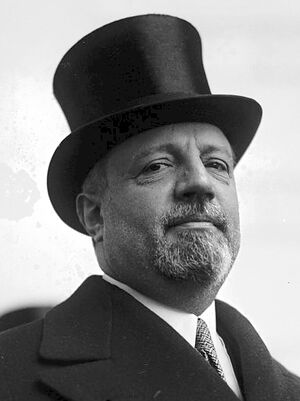Giuseppe Volpi
(deep politician, businessman) | |
|---|---|
 | |
| Born | 19 November 1877 |
| Died | 16 November 1947 (Age 69) |
| Nationality | Italian |
| Alma mater | University of Padua |
| Children | Giovanni Volpi |
| Party | National Fascist Party |
Giuseppe Volpi, 1st Count of Misrata was an Italian businessman and deep politician. He was the man behind Mussolini's fascist government from the seizing of power in 1922 until it collapsed in 1943. As Minister of Finance he restructured the Italian economy in a business-friendly direction.
Career
Count Volpi developed utilities which brought electricity to Venice, northeast Italy, and the Balkans by 1903.[1] In 1911–1912, he acted as a negotiator in ending the Italo-Turkish War.[2]
He was a freemason, together with Cesare Rossi, Giacomo Acerbo and Giovanni Marinelli. He joined the fascist movement and from 1922 to 1925 was governor of the Italian colony of Tripolitania. In this capacity he endorsed the harsh repressive actions (a genocide) ordered by General Rodolfo Graziani against the Libyan "rebels". In 1925 he was granted the title of Count of Misurata by king Vittorio Emanuele III. From 1925 to 1928 he was Minister of Finance of the Mussolini government: his government action was aimed at bringing the capitalists closer to fascism.[3]
As the Kingdom of Italy's Minister of Finance from 1925 until 1928, Volpi successfully negotiated Italy's World War I debt repayment with the United States[4] and with the United Kingdom,[5] pegged the value of the lira to the value of gold, and implemented free trade policies.[6] He was replaced in July 1928 by Antonio Mosconi.[7]
He was president of the Confindustria from 1934 to 1943. In this capacity, Volpi promoted the interests of Italian capitalism in the regime, ensuring in exchange the support and collaboration of the industrial world to fascism and Mussolini's political project, considered by the top industrialists as a modernizer and functional to their own interests. His policy inaugurated the "dirigiste" phase of the Mussolini government, characterized by a direct, widespread and pervasive intervention of the state in the economy: anti-inflationary measures and revaluation of the lira, attraction of foreign investors balanced by protectionism to protect Italian manufacturing. This support began to wane in 1943, when the serious destruction caused to Italian infrastructure and industrial plants by the Anglo-American offensive - and the awareness that the war was irremediably lost - put the country's political and economic framework in crisis.
References
- ↑ https://books.google.com/books?id=MrW5d7MZCgUC&pg=PA81
- ↑ https://web.archive.org/web/20081027215532/http://www.time.com/time/magazine/article/0,9171,728594,00.html
- ↑ https://web.archive.org/web/20120219125354/http://www.time.com/time/magazine/article/0,9171,881517,00.html
- ↑ https://web.archive.org/web/20120219122826/http://www.time.com/time/magazine/article/0,9171,928711,00.html
- ↑ https://web.archive.org/web/20110131195451/http://www.time.com/time/magazine/article/0,9171,721600,00.html
- ↑ https://web.archive.org/web/20101121021405/http://www.time.com/time/magazine/article/0,9171,723395,00.html
- ↑ https://web.archive.org/web/20101121042657/http://www.time.com/time/magazine/article/0,9171,787371,00.html
Wikipedia is not affiliated with Wikispooks. Original page source here